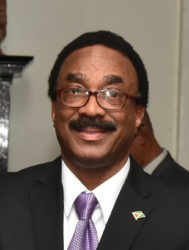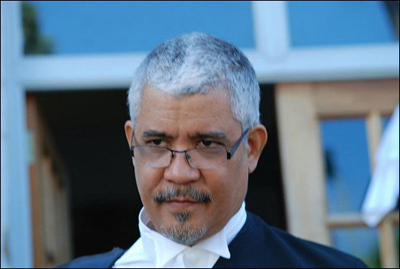CCJ hears arguments in third term case.
March 13 2018
In a more than six-hour long hearing before the Caribbean Court of Justice (CCJ), attorneys for the state yesterday argued that amendments to effect the presidential term limit were done in accordance with the Constitution, even as those representing the challenger maintained that a referendum was required and that the two-term restriction is unlawful.
The attorneys on both sides yesterday fiercely defended their respective positions before the Trinidad-based final court, which is expected to pronounce definitively on the challenge mounted to term limits by private citizen Cedric Richardson, thereby ending speculation about another run for office by former two-term president Bharrat Jagdeo.
The state has appealed decisions by both the Supreme Court and the Guyana Court of Appeal in favour of Richardson, who in the run-up to the 2015 general elections had challenged restrictions created by amendments to Article 90 of the Constitution that were enacted in 2001 after the bipartisan Constitution reform process.

His argument had been that Act No 17 of 2001, which was passed by a two-third majority of all elected members of the National Assembly to effect the term-limits, “unconstitutionally curtails and restricts” his sovereign and democratic rights and freedom as a qualified elector “to elect the person of former president Bharrat Jagdeo” as executive president.
The amended Article 90 of the Constitution states at Clause 2(a) that a person elected as president after the year 2000 “is eligible for re-election only once” and at Clause (3) that a person who acceded to the presidency after the year 2000 and served therein on a single occasion for not less than such period as may be determined by the National Assembly “is eligible for election as president only once.”
On July 9th, 2015, former Acting Chief Justice Ian Chang declared that the presidential term-limit was unconstitutional without the approval of the people through a referendum. In February, 2017 former acting Chancellor Carl Singh, and now retired Justice B S Roy dismissed the state’s appeal to Justice Chang’s ruling. Dissenting was then acting Chief Justice Yonette Cummings-Edwards.

While Trinidadian Senior Counsel Douglas Mendes for Richardson told the court yesterday that the amendments could only be effected via a referendum, Attorney General Basil Williams in his address said that the change is done by the elected representatives of the people in the National Assembly.
Referencing the “basic structure doctrine,” which Williams said was applied in the High Court and endorsed by the Court of Appeal, he argued that once manner and form are complied with as in the case of Article 164 (2)(b) of the Constitution, then a court should not enquire into its propriety.
That article, he argued, clearly permits alterations to Article 90 once they are done in line with the prescribed procedure. This procedure, he pointed out, requires that it be passed in the National Assembly with a two-thirds majority and referred to the electorate for a referendum vote.
“However, the proviso further provides that the use of the referendum vote is not required if the alteration does not affect Articles referred to in Article 164(2) (a),” he explained.
As a result, he contended that neither the High Court nor the Court of Appeal should have entered into an inquiry as to whether the term limit was “proprietous etc., they would according to case law have been overstepping.”
Williams said that no use could have been made of the contents of the altered Article 90 of the Constitution “because the court ought not to have embarked on such an inquiry and, therefore, that embarkation ought not to have been used to bolster the contention of [the] respondent that Articles 1 and 9 were affected.”
It is the contention of Richardson [the respondent], that the amendments to Article 90 contravene his right to select a presidential candidate of his choice who would have already served two terms.
Justice Chang had agreed that the changes “curtail people’s democratic choices” and offend declarations in Articles 1 and 9 that Guyana is a “democratic state” in which “sovereignty resides in the people.”
Williams maintained, however, that the alteration to Article 90 had not altered Articles 1 and 9 as claimed and, therefore, does not require a referendum vote.
The Attorney General argues that the electorate had no democratic right to choose who will become the presidential candidate; instead, its right is to vote for the party list of its choice.
‘Failed to grasp’
Also presenting arguments, were Barbadian Queen’s Counsel Hal Gollop and Ralph Thorne, who were retained by the state to assist in presenting its case before the CCJ.
They advanced that Justice Chang failed to grasp the meaning of the word “sovereignty” in Articles 1 and 9.
According to Gollop, because of that failure, there was nothing to guide the court in interpreting Articles 1 and 9. Referencing case law, he submitted that the notion of sovereignty is an international law concept and that Chancellor Singh would have applied an international concept to deal with what essentially is a municipal law concept of sovereignty.
In so doing, Gollop said that Justice Singh “confused” himself and failed to show how sovereignty as implied in Article 9, operates to preclude a credible determination that Act No. 17 of 2000 impacted or amended the provision of the said article.
Article 9 states, “sovereignty belongs to the people, who exercise it through their representatives and the democratic organs established by or under this Constitution.”
Justice Singh’s confusion of the international law concept with that of the municipal law concept, according to Gollop, does not help to show how he could have determined that the concept interfered with Article 9 to the extent that it affected or amended it.
Resultantly, Gollop said that this leaves the court to speculate, which cannot be allowed. He said that the respondent has failed to establish how Act No. 17 amended Articles 1 and 9 so that an enquiry as to whether a president is restricted to two terms should be determined by referendum.
That power of the people, counsel argued, was transferred by the people to their Parliament so that the sovereignty of the people is guaranteed by their own act.
Meanwhile, Solicitor General Kim Kyte impressed upon the court to consider the factor of delay, while noting that Richardson had waited 14 years before deciding to challenge a sound and well-established procedure which had always been that one person cannot exceed two presidential term limits.
She noted that he sat idly by for more than a decade during which four elections were conducted after Act 17 had already been enacted in 2000.
Kyte argued that the court had an inherent jurisdiction to protect itself from the abuse of its own process. The delay of itself, she argued, can be seen as “an acquiescence of the validity of the act (Act No. 17 of 2000).”
Freedom of choice
For his part, Mendes argued that inherent in Article 9 is the right of a citizen to elect whomsoever they chose. The court was quick to point out, however, that the impossibility of such a wish being granted to every citizen in any part of the world.
As a matter of fact, it clarified that citizens elect, through an electoral process from a list of candidates presented by the political parties, as is the case in Guyana.
According to Mendes the “sovereignty of the people,” to which he said Article 9 speaks, becomes immediately undermined “as you begin to limit the persons they can choose as their representatives.”
Such a process, he asserted, must be done by a referendum.
He said that when a law is passed restricting the number of times which a persons can run for president having already served for two terms, it takes away the freedom of choice from an electorate.
Presiding over the hearing yesterday were President of the CCJ, Sir Dennis Byron, in association with Justices Adrian Saunders, Jacob Witt David Hayton, Winston Anderson, Denys Barrow and Maureen Rajnauth-Lee.
On the request of the court to bear in mind costs as it deliberates upon its ruling, both sides have indicated that they will discuss and communicate to the court through its Registrar, in two weeks’ time, any amount of costs which may be awarded to either side depending on the ruling.
Notices will thereafter be posted announcing the date for the ruling.
In his ruling, Justice Singh had found that the decision of the term limits rests with the people via a referendum and not the National Assembly.
He pointed out that Guyana can be described as a sovereign, democratic state and that democracy is a guarantee upon which the function of government in Guyana can be assessed.
Justice Singh had said that in deciding the appeal the court focused on the concepts of sovereignty and democracy as these words are used in Article 1 and 9 of the Constitution. He said that these concepts should be interpreted “with a clear understanding of the role of the citizens of Guyana in the exercise of their democratic entitlement and what is conferred upon them by virtue of the sovereignty that is vested in them.”
Justice Singh stressed that people should choose whom they “please to govern them” and noted that this is essential to all other rights.
Act No 17 of 2000 “waters down” the opportunity of the people of Guyana to elect the president of their choice though this is present in Article 1 and 9, he said.
Justice Singh also said when the Act No 17. of 2000 “altered” the provisions of Article 90, resulting in an increase in the number and categories of disqualified persons who the political parties might have considered as their candidate, which “effectively suppressed the right of the people to freely choose those persons whom they feel should represent them.” He said that this right of the people to choose is now controlled by the National Assembly.
However Justice Cummings-Edwards disagreed. While speaking for approximately one hour, she expressed the view that Act No 17 of 2000 “did not require approval by referendum.” As a result, she said she upheld the validity of that Act. “It is not unconstitutional. It did not diminish the democratic right of the electorate,” she expounded.
Moreover, she posited that it was Parliament that set the presidential term limit and later explained that it was the electorate who gave the National Assembly the power to amend the Constitution.
Jagdeo had repeatedly distanced himself from the case and had publicly said that he had no intention of running for office again. However, he is now the Opposition Leader and General Secretary of the PPP/C. It is that party’s General Secretary who has traditionally been its presidential nominee.
The PPP has also distanced itself from Richardson, who has kept himself away from any public scrutiny.
In light of the three senior Trinidad and Tobago attorneys representing Richardson before the CCJ, questions have been raised about his ability to mobilise top flight legal representation.
The Laing Avenue, Georgetown resident is being represented by Senior Counsel Mendes, in association with Devesh Maharaj and Associates and attorney Kandace Bharath.
